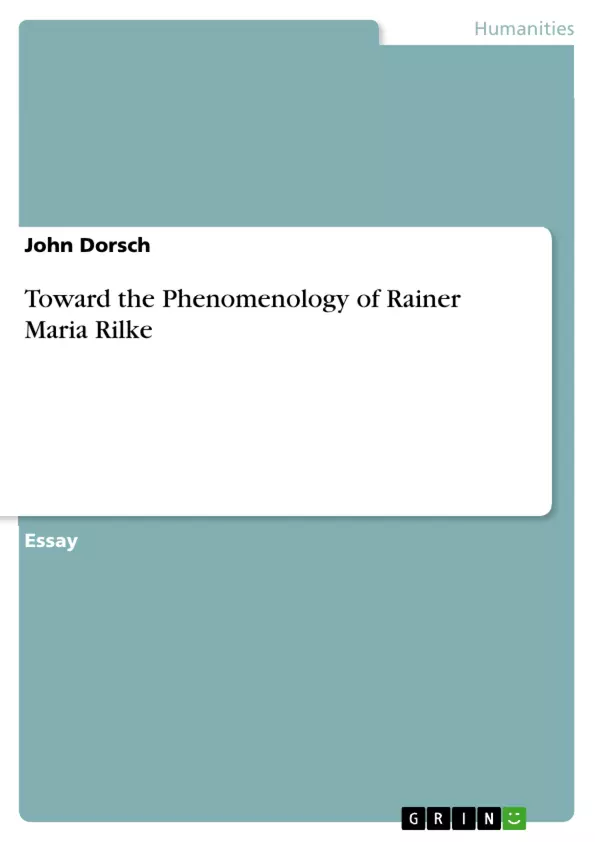An essay built upon the work of Käte Hamburger aimed at developing Rilke's theory of epistemology in relation to cognitive phenomenology.
Käte Hamburger has argued that Rainer Maria Rilke was a poet practicing phenomenology. This paper builds off her work, assuming Rilke to have conducted phenomenology by composing his lyric, and, with aid of the Neue Gedichte, seeks to address the tension between sensory and cognitive phenomenology. Cognitive Phenomenology is a new field of research that seeks to discover, if there be such a thing, the qualia of cognitive states. By a close reading of Husserl principle text, Logische Untersuchungen, this paper first established the structure of intentionality. We then apply Husserl's notion of intentionality to Rilke's lyric. The result of this research is that according to Husserl's analysis of intentionality, the existence of a pure cognitive phenomenology is left unanswered, but cognitive phenomenology does exist and is qualitatively different from sensory phenomenology. Lastly, we propose that the quale of a cognitive state is the same as the necessary conditions for that state, whose structure can, and should, be rigidly defined through linguistics. We conclude with the thought that this task would be the left to a new branch of linguistics called phenomenological linguistics. We argue our perspective with examples from Rilke's poetry.
Inhaltsverzeichnis (Table of Contents)
- Exposé into the Field of Cognitive Phenomenology
- Edmund Husserl's Conception of Intentionality, Logical Investigations
- Prolegomena zur reinen Logik
- Käte Hamburger, The Phenomenological Structure of Rilke's Poetry.
- Conclusion
- Bibliography
Zielsetzung und Themenschwerpunkte (Objectives and Key Themes)
This essay aims to explore the relationship between Rainer Maria Rilke's poetic practice and the field of cognitive phenomenology, building upon Käte Hamburger's argument that Rilke engaged in phenomenology through his lyric poetry. The essay investigates the tension between sensory and cognitive phenomenology and examines how Rilke's poetry, particularly the Neue Gedichte, illuminates the nature of cognitive experience.
- The concept of cognitive phenomenology and its ongoing debate about the existence and nature of qualia in cognitive states.
- The structure of intentionality as developed by Edmund Husserl in his Logische Untersuchungen.
- The application of Husserl's theory of intentionality to Rilke's poetry, particularly within the framework of cognitive phenomenology.
- The relationship between sensory and cognitive phenomenology and the potential for a distinct "phenomenological linguistics" to define the structure of cognitive states.
Zusammenfassung der Kapitel (Chapter Summaries)
- Exposé into the Field of Cognitive Phenomenology: This chapter introduces the emerging field of cognitive phenomenology, its key questions, and the debate surrounding the existence of qualia in cognitive states. It discusses the concept of propositional attitudes and the challenges of defining a distinct phenomenology for cognitive processes.
- Edmund Husserl's Conception of Intentionality, Logical Investigations: This section delves into Husserl's Logische Untersuchungen, examining his theory of intentionality and its relevance to cognitive phenomenology. It analyzes the relationship between intentionality and Wesenerschauung, and explores Husserl's understanding of the role of cognition in intentionality.
- Käte Hamburger, The Phenomenological Structure of Rilke's Poetry: This chapter focuses on Käte Hamburger's perspective on Rilke's poetry as an embodiment of phenomenology. It explores how Rilke's lyric works exemplify intentionality and potentially offer insights into the nature of cognitive experience.
Schlüsselwörter (Keywords)
The essay explores key concepts such as cognitive phenomenology, intentionality, qualia, propositional attitudes, sensory phenomenology, Husserlian phenomenology, and the poetic works of Rainer Maria Rilke. It delves into the philosophical and linguistic aspects of cognitive experience, drawing upon the writings of Edmund Husserl and Käte Hamburger.
Frequently Asked Questions
How does Rainer Maria Rilke relate to phenomenology?
Building on Käte Hamburger's work, the essay argues that Rilke practiced phenomenology through his lyric poetry, specifically by exploring the structure of intentionality.
What is cognitive phenomenology?
It is a field of research investigating whether cognitive states (like thinking or judging) have their own distinct "qualia" or experiential character, similar to sensory states.
How is Edmund Husserl's theory used in this analysis?
The paper applies Husserl's concept of intentionality from his "Logical Investigations" to Rilke's poetry to address the tension between sensory and cognitive experiences.
What is "phenomenological linguistics"?
The author proposes this new branch of linguistics to rigidly define the structure of cognitive states through the study of poetic and intentional language.
Which of Rilke's works are primarily analyzed?
The "Neue Gedichte" (New Poems) are the primary source used to examine how Rilke's lyric addresses the qualities of cognitive and sensory states.
- Quote paper
- John Dorsch (Author), 2014, Toward the Phenomenology of Rainer Maria Rilke, Munich, GRIN Verlag, https://www.grin.com/document/412280



